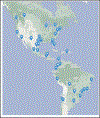Latin American Trans-ancestry INitiative for OCD genomics (LATINO): Study protocol
- PMID: 37946624
- PMCID: PMC11076176
- DOI: 10.1002/ajmg.b.32962
Latin American Trans-ancestry INitiative for OCD genomics (LATINO): Study protocol
Abstract
Obsessive-compulsive disorder (OCD) is a debilitating psychiatric disorder. Worldwide, its prevalence is ~2% and its etiology is mostly unknown. Identifying biological factors contributing to OCD will elucidate underlying mechanisms and might contribute to improved treatment outcomes. Genomic studies of OCD are beginning to reveal long-sought risk loci, but >95% of the cases currently in analysis are of homogenous European ancestry. If not addressed, this Eurocentric bias will result in OCD genomic findings being more accurate for individuals of European ancestry than other ancestries, thereby contributing to health disparities in potential future applications of genomics. In this study protocol paper, we describe the Latin American Trans-ancestry INitiative for OCD genomics (LATINO, https://www.latinostudy.org). LATINO is a new network of investigators from across Latin America, the United States, and Canada who have begun to collect DNA and clinical data from 5000 richly phenotyped OCD cases of Latin American ancestry in a culturally sensitive and ethical manner. In this project, we will utilize trans-ancestry genomic analyses to accelerate the identification of OCD risk loci, fine-map putative causal variants, and improve the performance of polygenic risk scores in diverse populations. We will also capitalize on rich clinical data to examine the genetics of treatment response, biologically plausible OCD subtypes, and symptom dimensions. Additionally, LATINO will help elucidate the diversity of the clinical presentations of OCD across cultures through various trainings developed and offered in collaboration with Latin American investigators. We believe this study will advance the important goal of global mental health discovery and equity.
Keywords: GWAS; Latin American; OCD; genetic; genomic; obsessive‐compulsive disorder.
© 2023 The Authors. American Journal of Medical Genetics Part B: Neuropsychiatric Genetics published by Wiley Periodicals LLC.
Update of
-
Latin American Trans-ancestry INitiative for OCD genomics (LATINO): Study Protocol.medRxiv [Preprint]. 2023 Feb 26:2023.02.23.23286373. doi: 10.1101/2023.02.23.23286373. medRxiv. 2023. Update in: Am J Med Genet B Neuropsychiatr Genet. 2024 Jun;195(4):e32962. doi: 10.1002/ajmg.b.32962. PMID: 37131804 Free PMC article. Updated. Preprint.
References
-
- Abramowitz JS, McKay D, & Storch EA (2017). The Wiley Handbook of Obsessive Compulsive Disorders. John Wiley & Sons. https://play.google.com/store/books/details?id=9okpDwAAQBAJ
-
- American Psychiatric Association. (2013). Diagnostic and statistical manual of mental disorders (5th ed.). American Psychiatric Association.
-
- Atkinson EG, Maihofer AX, Kanai M, Martin AR, Karczewski KJ, Santoro ML, Ulirsch JC, Kamatani Y, Okada Y, Finucane HK, Koenen KC, Nievergelt CM, Daly MJ, & Neale BM (2021). Tractor uses local ancestry to enable the inclusion of admixed individuals in GWAS and to boost power. Nature Genetics, 53(2), 195–204. 10.1038/s41588-020-00766-y - DOI - PMC - PubMed
Publication types
MeSH terms
Grants and funding
LinkOut - more resources
Full Text Sources
Medical


